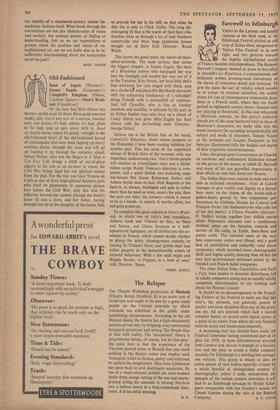Farewell to Edinburgh
Visas to the Lyceum and sundrY cinemas in the final week of the Edinburgh Festival yielded an odd crop of Italian films, designated all 'Italian Film Festival' in its own right, and two gestures towards the slightly old-fashioned notion of Franco-Scottish interdependence. The Renaud- Barrault Company showed its paces to fine effect in Anouilh's La Repatition, a compassionate and brilliantly written drawing-room melodrama on the theme of innocence tested and betrayed. To give the piece the sort of validity which enables us to accept its strained situations, the author places his cast of contemporary aristocratic deca- dents in a French castle, where they are found garbed in eighteenth-century dress—because they are 'playing at theatricals,' in this case rehearsing a Marivaux comedy. As this party's collective morals are of the same barnyard kind as those of Marivaux's characters, we easily slide into the mood necessary for accepting sympathetically the subject and mode of treatment. Simone Valero as the innocent and Jacques Dacqmine as her betrayer illuminated fully the heights and depths of their respective characterisations.
Later, the group gave Con naissance de Claudel, an unctuous and untheatrical illustrated lecture on the genius of the master, in which M. Barrault and many of his cast grovelled ungraciously in their efforts to ram him down our throats.
The Italian films were uneven in style and vari- able in technical smoothness : Notti di Cabiria manages to give vitality and dignity to.a thread- bare story on the theme of the harlot-with-a- golden-heare graced by two stupendous per- formances by Giulietta Masina (as Cabiria) and Francois Perier (the husband-to-be who robs her of her last penny). L'Ultimo Paradiso (director: F. Quilici) strings together four dullish stories about Polynesian islanders into a continuous, exultant paean on the beauties, rewards and terrors of life today in Tahiti, Bora-Bora and points south. This contains some of the very best underwater scenes ever filmed, and a good deal of uninhibited and culturally valid dance ceremonies which provided more choreographic thrill and higher-quality dancing than all but the very best performances witnessed earlier by the Swedish and French ballet companies.
The other Italian films, Guendalina and Pad"! e Figli, were studies in domestic disturbance full of solidly competent acting and an equally solidly competent determination to say nothing nevi about the Human Comedy.
It should be no discouragement to the Found- ing Fathers of the Festival to point out that this year's, the eleventh, was generally poorer in quality and more shapeless than any of the previ- ous ten. All arts festivals which lack a central constant theme, or master-artist figure, arrive at a point of no return from where the way forward must be tested and found experimentally.
A promising start has already been made, the 'Festival Committee having announced part of its plan for 1958; to have Glyndebourne essaying both Carmen and Alceste is enough of a fascina- tion and the plan to create a ballet companY specially for Edinburgh is a startling but courage- ous venture. This group is meant to give an entire season of new ballets specially created bY a whole handful of distinguished masters of choreography; unless I sadly miscalculate the strength of the balletic passion nowadays it will lead to an Edinburgh invasion by British ballet goers comparable with last October's assault oft Covent Garden during the visit of the Bolshoi


































 Previous page
Previous page